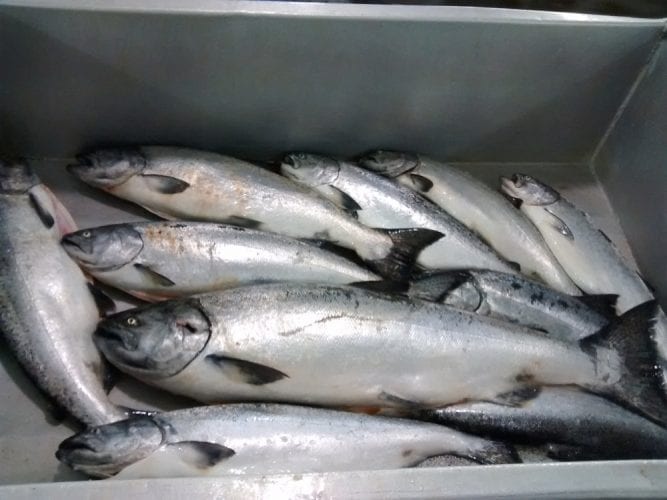
(Photo courtesy of Matt Lichtenstein)
A controversial 2023 court ruling ordering the closure of commercial trolling for king salmon, or chinook, in Southeast Alaska has been lifted.
The 9th Circuit Court of Appeals on August 16 partially reversed a lower court ruling stemming from a lawsuit brought by a Washington state conservation group hoping to protect an endangered population of killer whales. The panel of three judges decided that shutting down the fishery is the wrong prescription for the whales’ survival.
When judges Mark Bennett, Anthony Johnstone, and Milan Smith Jr. heard oral arguments for the case on July 18, they expressed sympathy for the Southeast communities that would suffer severe economic consequences from losing the fishery. The judges’ August 16 decision echoes that sentiment, saying that the initial ruling “glossed over significant economic consequences, as well as the downstream social and cultural harms to fishing villages and Alaska Natives.”
The court’s action wasn’t entirely unexpected. Last year the panel ordered a stay of the lower court ruling just eleven days before the start of the July 1 summer troll season, and fishing took place as usual. Nevertheless, the lower court ruling had not been vacated, leaving the future of the fishery in doubt.
While Friday’s decision clears the air in that respect, some issues remain unsettled: The judges didn’t rule on whether the National Marine Fisheries Service broke the law by letting Southeast trollers catch too many kings. The National Marine Fisheries Service has until December 1 to fix its errors and write a new biological opinion on the management of king salmon. During oral arguments in July, federal managers assured the court that a new opinion would be completed on time.
The Wild Fish Conservancy first filed suit in 2020, arguing that the National Marine Fisheries Service had failed to account for the impact of commercial king trolling in Southeast on the food supply of Southern Resident killer whales, whose population has now dropped to around 70 animals in Washington’s Puget Sound. The organization did not take kindly to the partial reversal of the previous ruling.
In an emailed statement to KFSK, Wild Fish Conservancy Executive Director Emma Helverson read: “The Court’s decision prioritizing the economic interests of one Alaskan industry over the coastwide recovery of Chinook, the survival of the Southern Resident orcas, and the communities from Oregon to British Columbia who depend on these salmon is disappointing to say the least. However, the facts and science remain clear and I’ve never been more optimistic as certifiers, consumers, and communities rise up to demand sustainable and equitable harvest management that will bring their salmon home. We will continue to take every action necessary to ensure the management of this fishery will not continue to harm salmon, ecosystems, and communities coastwise.”
But in Southeast Alaska, some trollers are celebrating — like Amy Dauhgerty, the Executive Director of the Alaska Trollers Association, a trade organization that represents Alaska’s troll fleet. She said she was elated to get the news.
“We’re just really pleased that the court reversed the lower court findings and basically is going to be allowing trolling,” said Daugherty. “It just would have had large impacts felt throughout the entire Southeast region.”
Daugherty says the fight to protect her gear group’s access to kings isn’t over. The Alaska Trollers Association is now turning its complete attention to the Wild Fish Conservancy’s petition to put Gulf of Alaska king salmon on the Endangered Species List.
The defendant in the lawsuit, the National Marine Fisheries Service, did not respond to a request for comment before press time.











